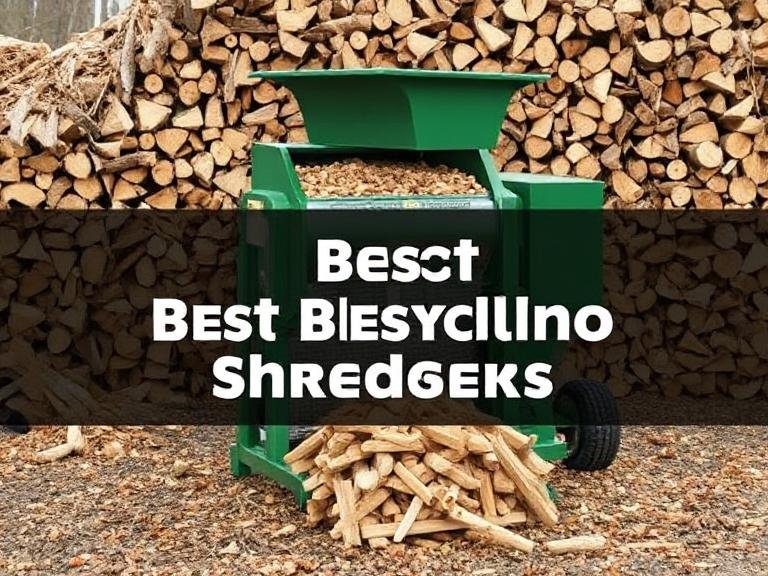Table of Contents
- Introduction
- Why Wood Recycling Matters
- Key Factors to Consider When Choosing a Shredder
- Top 6 Wood Recycling Shredders
- In-Depth: 300kg DIN P-5 Industrial Garbage Shredder
- Frequently Asked Questions
- Conclusion
- Summary Table
Introduction
The demand for sustainable solutions in industrial waste management has fueled interest in wood recycling shredders. These machines play a crucial role in reducing wood waste, minimizing environmental impact, and converting waste into reusable resources. Whether you’re a manufacturer, recycler, or contractor, the right shredder will increase efficiency, reduce disposal costs, and contribute to a circular economy.

Why Wood Recycling Matters
Wood is one of the most commonly discarded materials in construction, packaging, and furniture industries. Recycling it offers several benefits:
- Reduces landfill waste and saves space.
- Conserves natural resources like trees and water.
- Generates bioenergy or raw material for manufacturing particleboard and mulch.
- Reduces carbon footprint by limiting greenhouse gas emissions from decomposition.
Key Factors to Consider When Choosing a Shredder
1. Shredding Capacity
- Measured in kg/hr or tons/day.
- Choose based on daily workload. For high-volume facilities, a 300kg/hr shredder is ideal.
2. Shred Size and Security Level
- Shred size affects downstream processing and material reuse.
- DIN P-5 or finer shredders are perfect for high-security or fine processing needs.
3. Motor Power and Speed
- Higher motor power = better shredding of thick and hard wood.
- Speed affects productivity. Look for 20–25 m/min for industrial efficiency.
4. Noise Level
- 70–75 dB(A) is considered industrial-safe with minimal noise pollution.
5. Build Quality and Dimensions
- Ensure the shredder fits your space and is made with durable, high-grade steel.
Top 6 Wood Recycling Shredders
1. 300kg DIN P-5 Industrial Garbage Shredder

- Capacity: 300 kg/hr (~30,000 sheets/hour)
- Shred Size: 0.8mm or 1.5mm for high-security shredding
- Motor Power: 7.5 – 15 kW
- Speed: 20–25 m/min
- Noise: 70–75 dB(A)
- Bin Capacity: 300–500 liters
- Application: Ideal for industrial use where precise and secure shredding is needed
2. Vecoplan VAZ 1600
- Capacity: Up to 4 tons/hour
- Cutting Mechanism: Rotor with replaceable cutters
- Application: Large-scale furniture or construction waste shredding
- Additional Features: Auto feed, smart overload protection
3. UNTHA LR700 Wood Shredder
- Motor: 18.5 kW
- Cutting System: Single-shaft, robust design
- Ideal for: Joinery shops and timber processing plants
- Output: Chips suitable for briquetting or combustion
4. WEIMA WL 4 Shredder
- Throughput: 90–150 kg/hr
- Cutting Shaft: V rotor for efficient material grabbing
- Use Case: Small to mid-sized woodworking shops
- Additional Options: Conveyor belt integration
5. Komar Shredders – Continuous-Duty Wood Systems
- Power: Up to 60 HP motors
- Specialization: Large wood and pallet shredding
- Output: Sized for fuel or recycling
- Bonus: Heavy-duty, built for 24/7 operation
6. SSI Dual-Shear® M120
- Type: Dual-shaft shredder
- Best For: Heavy-duty wood, pallets, and construction debris
- Cutting Area: Wide chamber for bulk material
- Speed: Moderate shredding with high torque for tough materials
In-Depth: 300kg DIN P-5 Industrial Garbage Shredder
This shredder stands out for its precision, high security, and customization options. Built for industrial environments, it can handle high volumes without compromising on cut size or output consistency.
Key Specifications:
- Shredding Capacity: 300 kg/hr or approx. 30,000 sheets/hour
- Shred Size: Options of 0.8mm or 1.5mm
- Security Level: DIN P-5
- Feeding Width: 500mm (handles A3 and A4 materials)
- Motor Power: 7.5 to 15 kW
- Operating Voltage: 380V/50Hz, 3-phase (custom available)
- Shredder Speed: 20–25 meters per minute
- Noise Level: 70–75 dB(A)
- Bin Capacity: 300–500 liters
- Dimensions: 2000mm x 1200mm x 1800mm
- Weight: 1200–1800 kg
Why It’s One of the Best:
- High security shredding: Ideal for confidential industrial waste
- Customizable size and voltage for regional or functional needs
- Heavy-duty performance without excessive noise
Frequently Asked Questions
What is the difference between DIN P-3, P-4, and P-5?
DIN P-levels refer to the security level of shredding. P-3 offers standard strip cuts, while P-5 produces micro-cut shreds ideal for high confidentiality.
Can a wood shredder handle nails or screws?
Most industrial wood shredders like dual-shaft or continuous-duty machines can handle small metal contaminants. However, pre-sorting is still recommended.
How do I maintain my wood recycling shredder?
- Regular lubrication
- Blade sharpening or replacement
- Periodic inspection of motor and belts
- Cleaning the bin and chamber
What type of wood can I shred?
These machines can handle:
- Plywood and hardwood
- Softwood and pallets
- Trimmed branches and lumber scraps
Conclusion
Choosing the right wood recycling shredder depends on your volume, application, and budget. Industrial facilities with constant loads will benefit most from machines like the 300kg DIN P-5 shredder due to its precision and throughput. For smaller operations, models from UNTHA or WEIMA provide an ideal balance of performance and affordability.
Each model on this list is built for durability, efficiency, and safe shredding operations. Investing in a high-quality shredder not only boosts operational efficiency but also helps contribute to a greener, more sustainable world.
Summary Table
| Model | Capacity | Shred Size | Best For |
|---|---|---|---|
| 300kg DIN P-5 Shredder | 300 kg/hr | 0.8mm / 1.5mm | Industrial secure shredding |
| Vecoplan VAZ 1600 | 4 tons/hr | Varied | Large-scale furniture or wood waste |
| UNTHA LR700 | Mid-range | Custom chips | Joinery and timber processing |
| WEIMA WL 4 | 90–150 kg/hr | Medium cut | Small to medium wood shops |
| Komar Continuous-Duty | High-volume | Rough cut | Pallet and thick wood shredding |
| SSI Dual-Shear® M120 | Heavy-duty | Large particle | Construction and demolition debris |
